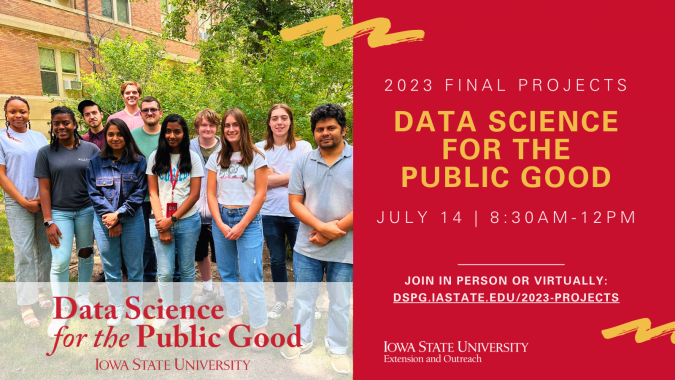DSPG Past Projects and Final Presentations
Questions regarding DSPG can be sent to dspg@iastate.edu.
DSPG Disclaimer: Please note that the data and results presented are student work. While the students strive to be as complete and accurate as they can, this is also a learning internship and therefore errors may exist. Following these student presentations, faculty and staff review the data, scripts and results before use in final publications.
2024 DSPG Projects
The final presentations for the 2024 Iowa State University Data Science for the Public Good (DSPG) program took place at 9:15 AM, July 26th at the Student Innovation Center Room 0114. Links to the recorded presentations are available below. Questions regarding DSPG can be sent to dspg@iastate.edu.
DSPG Disclaimer: Please note that the data and results presented are student work. While the students strive to be as complete and accurate as they can, this is also a learning internship and therefore errors may exist. Following these student presentations, faculty and staff review the data, scripts and results before use in final publications.
| 9:15 - 9:30 | Introduction to DSPG Presentations |
| 9:30 - 10:15 | Presentation: Housing and AI Project |
| 10:15 - 10:30 | Session Q&A |
| 10:30 - 11:15 | Presentation: Community Capitals |
| 11:15 - 11:30 | Session Q&A |
| 11:30 - 12:15 | Presentation: Iowa Zoning Guide Project |
| 12:15 - 12:30 | Session Q&A |
| 12:30 - 12:40 | Concluding Remarks |
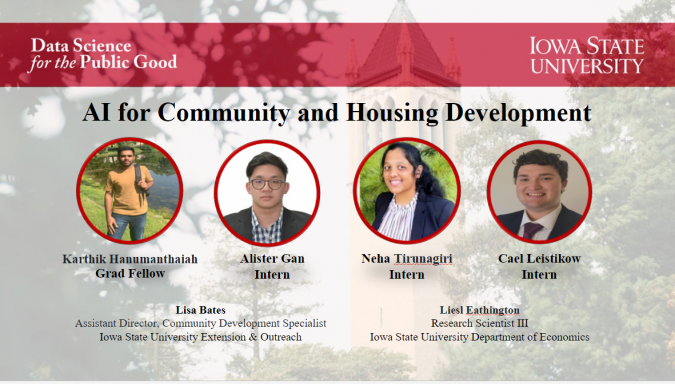 |
AI for Community and Housing Development The Housing and AI project is working on building a tool to help bring Artificial intelligence to housing and community development. The goal is to make the most up-to-date data available and easily accessible for housing and communities to make better-informed decisions. The tool makes use of a large language model to help answer different questions about housing and community problems, backed by the data. The tool could potentially help various roles like community planners, builders, and the policymakers involved in housing and community development. |
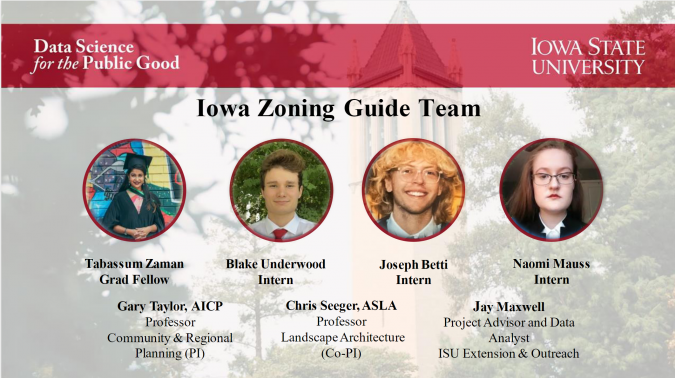 |
Iowa Zoning Guide: An Inventory Analysis of Iowa's Communities The lowa Zoning Guide project is a comprehensive, interactive mapping effort that will display housing-related zoning regulations by district for 327 lowa cities. The project will collect and analyze data on several socioeconomic factors influencing housing in these cities. Our website developers will then use the data to build the Online Guide to lowa Zoning map, providing comprehensive insight into the factors affecting the production and preservation of housing across lowa. |
 |
Healthy Community Capitals The Community Capitals project seeks to explore the relationship between community capital indicators and the overall condition of communities in Iowa, aiming to identify strengths, weaknesses, opportunities, and gaps within these communities. The main work focuses on major events such as natural disasters, job losses, new job creation, school closures, and new opportunities for tourism and healthcare. The study seeks to identify the most relevant community capitals, trends over time, and the impact on community resiliency, by analyzing correlations between various indicators and comparing quantitative data with some qualitative insights. |
2023 DSPG Projects
The final presentations for the 2023 Iowa State University Data Science for the Public Good (DSPG) program took place on July 14th from 8:30am to 12pm at the Student Innovation Center. Presentations recordings and links to project files are available below. Questions regarding DSPG can be sent to dspg@iastate.edu.
Presentation Schedule:
8:30 Welcome and 'Coffee Talk' with Dr. Shawn Dorius, ISU Department of Sociology and Criminal Justice
9:00 Data-Driven Insights for Local Food Markets: AI, Pricing, and Crop Flow
10:00 Using Data to Inform Decision Making for Rural Grocery Stores
11:00 WINVEST (Walking Infrastructure Investigation)
11:10 AI-Driven Housing Evaluation for Rural Community Development
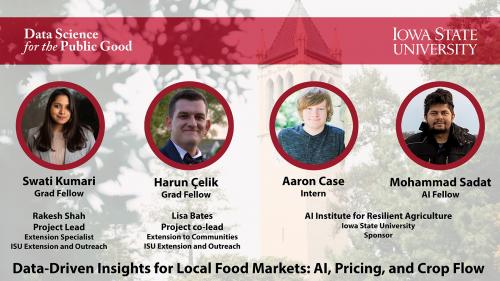 |
Data-Driven Insights for Local Food Markets: AI, Pricing, and Crop Flow This project focuses to enhance local food markets by providing valuable insights and optimizing the crop flow. It involves creating a comprehensive map showcasing the prices of eggs and bacon across counties, developing web-scraping spiders for data collection, and demonstrating their effectiveness with a specific crop example. Additionally, the project also aims on optimizing the crop flow from supply to demand, maximizing overall profit through AI algorithms that consider factors like transportation costs. |
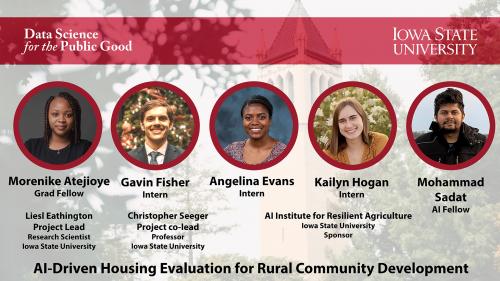 |
AI-Driven Housing Evaluation for Rural Community Development The absence of a comprehensive assessment of housing quality in rural areas of Iowa hinders resource allocation and negatively impacts residents' well-being and economic growth. Evaluating existing housing conditions is subjective and lacks thorough investigations due to limited resources. To address these challenges, an AI-driven approach is proposed. By utilizing web scraping and AI models, housing features can be categorized as good or poor quality, enabling targeted investment strategies, and directing financial resources where they are most needed. This project aims to eliminate biases, streamline housing evaluations, and inform decision-making for rural housing investment and development initiatives. |
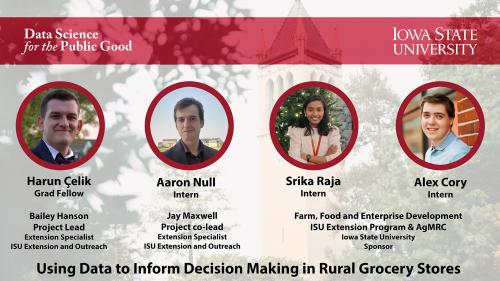 |
Using Data to Inform Decision Making for Rural Grocery Stores This DSPG project aims to develop a tool that will help provide users information on opening, inheriting, and operating grocery store in their preferred rural location. The DSPGGrocery package, which hosts the calculations for the project is hosted on an R Shiny application to perform dynamic calculations based on user-given input to estimate revenues and costs with opening a grocery store in a particular location. |
|
WINVEST (Walking Infrastructure Investigation) The DSPG Summer 2023 students worked on a collaborative project this summer as part of the education and outreach component of DSPG. This project partnered with Council of Governments (CoGs) serving selected communities to provide on the ground data in neighborhoods to accurately assess and map community infrastructure features in order to identify multiple projects appropriate for CDBG infrastructure funding. DSPG students utilized map collection technologies (smart phones and Global Positioning Systems app) to inventory neighborhoods infrastructure and overlay this site level data with other community attributes as part of the deliverable for this project.
|
2022 DSPG Projects
The final presentations for the 2022 Data Science for the Public Good Program were held on Thursday August 4th, 2022 via Zoom. Recordings of the presentations are provided below.
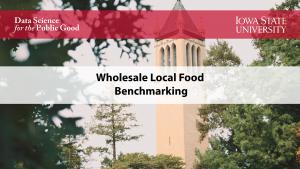 |
Wholesale Local Food Benchmarking Iowa is currently in need of a data process/platform that will provide more localized and up to date information on regional food systems, specifically information around price points for local products. The Iowa State Farm Food and Enterprise Development (FEED) is frequently asked for benchmarks on pricing of products both in retail and wholesale spaces. There is a need for additional data and research on the potential sales point for these wholesale products when many of our specialty crop producers across the state are operating in direct-to-consumer retail spaces. While data is available from the AMS and USDA (including the Agricultural Census), there is limited aggregation of sales for these products at the local level. |
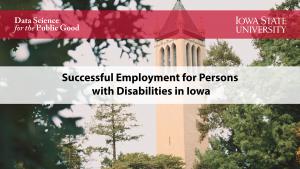 |
Successful Employment for Persons with Disabilities in Iowa Data on disabilities for practical use by Iowa’s policy makers, advocates, and grant seekers are often difficult to access or displayed independently to one another. This presents a difficulty in fully understanding the complexities surrounding persons with disabilities and their success at employment in Iowa’s workforce. To tackle the accessibility of this data, this project aims to discover, profile, and present data pertaining to successful employment for Iowans with disabilities and to serve as a foundation for connecting various data sources on employment through the assessment of public services available to Iowans with disabilities. |
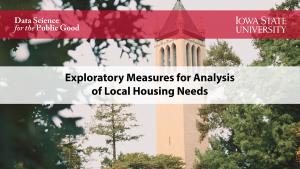 |
Exploratory Measures for Analysis of Local Housing Needs Local housing policy seeks to balance private sector realities with public sector goals. Key concerns of local decision-makers include availability, affordability, and accessibility of housing stock. Effective housing policy development requires awareness of the types and extent of local housing need as well as the barriers to private sector investment. Accordingly, local decision-makers seek reliable and current sources of data to help set their housing policy priorities. This process might face hardships due to time and budget limits, inflexible tabulation formats, lack of detail and time sensitivity in data sources. In this project, we explored how much and what types of data are available to describe local housing markets. We obtained, reorganized, categorized, and analyzed data sets from a wide variety of housing-related sources. Finally, we provided a set of housing-related indicators summarized and visualized in a unified format to provide decision-makers with the opportunity of housing status evaluation and comparison among different geographical levels of communities. |
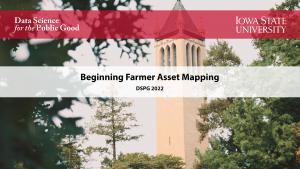 |
Beginning Farmer Asset Mapping This project formed as a need to aid beginner farmers in making the right choices for their farming practices through an interactive application. Through research on specialty crops, soil information and climate data, the project aims to display pertinent farming factors in relation to one another to provide feasible options for beginning farmers. Using leaflet and Tableau, created a dashboard that would dynamically update information to match location and specialty crop information. We hope that this project serves as the foundation for getting farmers setup on their next farming journey. |
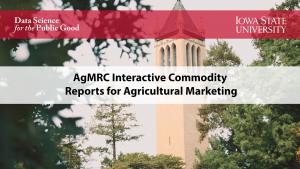 |
Interactive Commodity Reports for Agricultural Marketing (AgMRC) AgMRC commodity reports can be used as preliminary research in order to determine current production, market analysis, demographic data, and price points. It can be useful when applying for grants, financial institution loans, and other types of funding. The customizable marketing studies provide market intelligence to Value Added Producer Grant (VAPG) applicants that can be easily incorporated into feasibility studies and business plans that support the application process. Reports will have demographic data (population, race, ethnicity, family structure, income), food data (food deserts, food security, market kinds - schools, restaurants), interactive visualization, and improved geographic filters to offer national and state-level data that can be downloaded as pdf. |
2021 DSPG Projects
Iowa’s Integrated Data System for Decision-Making (Early Childhood Iowa)
The purpose of this project is to build an interactive dashboard for Early Childhood Iowa with the capacity to connect with I2D2 and identified national, state, and local sources. We aimed at 22 indicators as our primary data resource of the dashboard, including the data from IDPH, IDSH, CDC, etc. We implemented several tools to scrape the data that we collected from each indicator in a different format, and the dashboard users can pull the data from the dashboard in pdf or CSV file format. Furthermore, we also created various visualization for the dashboard user to analyze the data more directly.
Final Presentation info: https://datascienceforthepublicgood.org/events/dspg2021/postersessions/iowas-integrated-data-system-decision-making-early-childhood-iowa
Project Leadership: Todd Abraham
Graduate Fellow: Tiancheng Zhou
Summer Interns: Dylan Mack, Avery Schoen, Sonyta Ung
Supporting Eat Greater Des Moines and Food Rescue in Central Iowa
This project looks at the non-profit organization Eat Greater Des Moines (EGDM) and its food rescue efforts. EGDM takes donations of surplus food from grocery and convenience stores, restaurants, and other locations and transports it to food pantries, non-profits, schools, housing locations, and other organizations that can distribute food to those that need it. In the project, the team used data provided by EGDM and other sources to demonstrate where food rescue currently happens, where it can be expanded, and what areas can benefit most from food rescue. The team has also built a data pipeline and dashboard that is sustainable for EGDM and will be used by the organization moving forward to support their food rescue efforts.
Final Presentation info: https://datascienceforthepublicgood.org/events/dspg2021/postersessions/supporting-eat-greater-des-moines-and-food-rescue-central-iowa
Project Leadership: Adisak Sukul
Graduate Fellow: Matthew Voss
Summer Interns: Zachary Johnson, Ellie Uhrhammer, Saul Varshavsky
DHR “Just the Facts” on Educational Attainment
The aim of this project is to develop a series of indicators that identify the post-secondary educational attainment of disproportionately impacted communities in Iowa. The team has investigated data related to educational opportunities, attainment and outcomes of the identified population groups. These data has been cleaned and integrated into a data pipeline. To finally be presented as engaging, unbiased infographics and visuals through a publication series titled Just the Facts. The team has worked closely with the DHR educational attainment and economic and workforce development teams to collaborate on and share general data resources such as population, demographics and languages spoken that are specifically related to the identified disproportionately impacted populations in Iowa. The team has worked closely with the DHR educational attainment and economic and workforce development teams to collaborate with and share general data resources such as population, demographics and languages spoken that specifically related to the identified disproportionately impacted populations in Iowa.
Final Presentation info: https://datascienceforthepublicgood.org/events/dspg2021/postersessions/just-facts-educational-attainment
Final Presentation Recording: https://youtu.be/MYCkJEQExF0
Project Leadership: Bailey Hanson, Christopher Seeger
Graduate Fellow: Amanda Rae
Summer Interns: Laailah Ali, Max Ruehl, Ellie Uhrhammer
DHR “Just the Facts” on Economic and Workforce Development
The mission of the Iowa Department of Human Rights (IDHR) is to empower underrepresented Iowans through advocating for the elimination of economic, social, and cultural barriers to full participation in civic life. To that aim, we analyzed data and created indicators to identify employment and earnings opportunities for disproportionately impacted communities in Iowa. These communities include racial and ethnic minorities, women, and individuals with disabilities. We also developed a web application to explore language usage across the state of Iowa.
Final Presentation info: https://datascienceforthepublicgood.org/events/dspg2021/postersessions/dhr-just-facts-economic-and-workforce-development
Final Presentation Recording: https://youtu.be/Fb3jB-Zhbjk
Project Leadership: Christopher Seeger, Bailey Hanson
Graduate Fellow: Joseph Zemmels
Summer Interns: Zachary Johnson, Dylan Mack, Avery Schoen
Quality of Life in Small and Shrinking Iowa Cities
This project focuses on factors affecting the perception of quality of life in small and shrinking rural communities in Iowa. The goal is to help communities focus their limited resources on improving quality of life rather than using scarce resources to try to grow (as this is unlikely in most towns). Residents and leaders of small rural towns are collaborators and stakeholders of the umbrella NSF project. The team is building a community information ecosystem that will be available through an online web application. This ecosystem makes use of publicly available data and links it to some proprietary data sets to help communities understand, utilize, and collect new data about their towns and peer communities. The ecosystem will use statistical modeling and cutting-edge visualization strategies to make data more accessible to stakeholders in these communities, including city staff, local leaders, and the public.
Final Presentation info: https://datascienceforthepublicgood.org/events/dspg2021/postersessions/quality-life-small-and-shrinking-cities-iowa
Project Leadership: Heike Hofmann
Graduate Fellow: Amanda Rae
Summer Interns: Laailah Ali, Max Ruehle, Jack Studier
Assessing the impact of publicly accessible research data: what can repositories tell us about data reuse?
In this project, we aim to understand better what makes a data source reusable to another researcher by focusing on the repository component of the data-sharing ecosystem. We have explored a list of data repositories and looked for the associated metrics that suggest reusing a data source, and analyzed factors associated with higher levels of reuse and potential impact. Our two approaches are getting API requests and HTML scraping, which helped us extract the metrics from the repositories we assigned to, and use correlation plots to analyze the impact of reusability from each metric. Overall, this study is a repository-focused complement to a larger researcher-centered effort to develop a path for accelerating community readiness in creating reusable publicly accessible data products.
Final Presentation info: https://datascienceforthepublicgood.org/events/dspg2021/postersessions/assessing-impact-publicly-accessible-research-data-what-can-repositories-tell-us-about-data-reuse
Project Leadership: Adisak Sukul
Graduate Fellow: Tiancheng Zhou
Summer Interns: Jack Studier, Sonyta Ung, Saul Varshavsky
2020 DSPG Projects
Enlarge ISU Extension Community Helpline Services
Iowa’s Extension and Outreach program provides resources for communities, businesses, and nonprofits via six help and support hotlines. The use of hotlines has increased dramatically with the onset of COVID-19. Our team partnered with hotline managers to understand the system architecture, data structure and quality, and past uses of the data generated by the hotlines. Using this information, we piloted interactive dashboards on call topics, outcomes, and emotional content (via sentiment scoring of generated transcripts) to support improved customer service, monitor success, and auto-generate reports so hotline workers can spend more time helping citizens and less time filling out paperwork.
Final Presentation: https://datascienceforthepublicgood.org/events/symposium2020/poster-sessions/isu-helpline
Project Leadership: Adusak Sukul & Shawn Dorius
Graduate Fellow: George Thomas
Summer Interns: Kok Kent Chong, Andrew Maloney, Xinyi Zhu
Identify Communities in Greatest Need of Excessive Alcohol Prevention Efforts
Iowa ranks in the top 10 among U.S. states for binge drinking, costing roughly $635 per person in Iowa. Understanding who is at risk for excessive alcohol use and where they reside can help Iowa’s Substance Use Bureau better target prevention resources to manage alcohol-related problems. This project identified and spatially mapped the characteristics of heavy daily alcohol users, forecasted alcohol sales by county, and analyzed the prevalence of people who have been involved in car crashes after using alcohol or drugs. Interactive data tools were generated to facilitate decision making by policymakers, public health officials, and extension specialists.
Final Presentation: https://datascienceforthepublicgood.org/events/symposium2020/poster-sessions/isu-alcohol-prevention
Project Dashboard: https://publicsciencecollaborative.shinyapps.io/dspg20alcohol/
Project Leadership: Christopher Seeger, Heike Hofman, Shawn Dorius
Graduate Fellow: George Thomas
Summer Interns: Kok Kent Chong, Kathleen M Thompson, Xinyi Zhu, Ilma Jahic
Pilot a ‘Systems of Care’ Data Infrastructure to Support State Prevention, Treatment and Safety Response
Government programs often develop within agency silos, making it difficult to support ‘whole community’ responses to pressing problems. To combat this issue, the Iowa Linkage to Care Advisory Board was created to embrace cross-agency evidence-based policymaking in statewide prevention, treatment, and public safety response efforts. This project identified, web-scraped, and spatially mapped publicly available data reflecting formal and informal ‘Systems of Care’ that support resilience related to mental health, physical health, education, workforce development, and child care. Interactive data tools and insights catalog and improve awareness of state resources in support of the Board’s ongoing efforts to address systemic change. The goal of the project is to describe the services and resources, that when present in a community, provide the necessary elements to promote the successful recovery process of individuals living and engaging within that community.
Final Presentation: https://datascienceforthepublicgood.org/events/symposium2020/poster-sessions/isu-systems-of-care
Project Leadership: Heike Hofman, Shawn Dorius
Graduate Fellow: Kishor Kumar Sridhar
Summer Interns: Andrew Maloney, Joel Von Behren, Matthew Voss
Develop a Community Capitals Data Infrastructure to Support Community Economic Mobility
Iowa’s Extension and Outreach leadership identified the need for a statewide community data infrastructure to support precision funding and targeted education in response to COVID-19. This project utilized the Community Capitals Framework to identify, collect, and spatially map county-level indicators of human, financial, natural, and social assets related to upward economic mobility. Interactive data tools were designed to support Extension leadership in identifying and monitoring the impact of COVID-19 on rural community recovery. Dashboards are intended to be paired with CES administrative files, so leaders can visually identify opportunities to more effectively match resource/programming supports with community needs.
Final Presentation: https://datascienceforthepublicgood.org/events/symposium2020/poster-sessions/isu-economic-mobility
Project Leadership: Cass Dorius, Todd Abraham, Christopher Seeger
Graduate Fellow:
Summer Interns:
Identifying Communities Ready and Able to Support Substance Use Recovery Centers
Government programs often develop within agency silos, making it difficult to support ‘whole community’ responses to pressing problems. To combat this issue, the Iowa Linkage to Care Advisory Board was created to embrace cross-agency evidence-based policymaking in statewide prevention, treatment, and public safety response efforts. This project identified, web-scraped, and spatially mapped publicly available data reflecting formal and informal ‘Systems of Care’ that support resilience related to mental health, physical health, education, workforce development, and child care. Interactive data tools and insights catalog and improve awareness of state resources in support of the Board’s ongoing efforts to address systemic change. The goal of the project is to describe the services and resources, that when present in a community, provide the necessary elements to promote the successful recovery process of individuals living and engaging within that community.
Final Presentation: https://datascienceforthepublicgood.org/events/symposium2020/poster-sessions/isu-recovery-centers
Project Leadership: Shawn Dorius, Cass Dorius
Graduate Fellow: Atefeh Rajabalizadeh
Summer Interns: Jessie Bustin, Grant David Durbahn, Vikram Magal

